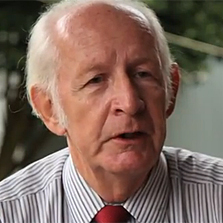
For 12 years, James Pilgrim has managed a mobile home park in the Birmingham, Ala. area, getting to know families who have lived there for years. Most of them are from Mexico, so he has taken part in a lot of their traditions.
“When I have a birthday party generally they’ll provide a cake and the custom of the Hispanic people is to let you blow the candles out and when you do, they push your head into the cake,” he said, laughing. “So I’ve had cake all over my face. . . We’ve just been close. We go places together, we do things together.”
But since parts of Alabama’s anti-immigrant law, H.B. 56, took effect, Pilgrim said about 10 families have fled. The fear of racial profiling and other harmful aspects of the law forced them to leave for other states or Mexico, he said.
Please note that by playing this clip You Tube and Google will place a long-term cookie on your computer. Please see on their website and on theirs to learn more. To view the ACLU's privacy statement, click here.
“You just want to stand there and cry,” he said, “watching people treated like this, where they had to run for their lives.”
Most of the families have lived in the community for years, hold steady jobs and contribute to Alabama’s economy, Pilgrim said. He is concerned more families may leave soon because registrations for mobile homes must be renewed by Nov. 30, and many residents may not have the documents needed to register under the new law.
As a small business owner, Pilgrim said he is very concerned about the law’s negative financial impact. Jefferson County, which is Alabama’s most populous county, this month , the largest municipal bankruptcy in U.S. history. And Alabama has the 10th highest poverty rate in the nation, with of the state’s residents living in poverty.
A native of Georgia who has lived in Alabama since 1971, Pilgrim says he is strongly opposed to H.B. 56 and the chaos it has caused in his state.
“It affects me in that some of them are just like my own family,” he said of the impacted families, “and my heart is broken to think that I might never see these people again.”
Pilgrim is not alone. Bill Bounds, who manages a mobile home park in the Birmingham area, said a handful of Hispanic families fled the park since the law took effect.
“One of them threw me their keys and said, “’Here, sell my home,’” he said. “(The law) has uprooted a lot of people and so many children. They left furniture and stuff they worked hard for.”
Because the law allows police to check people’s immigration status based on “reasonable suspicion,” many families have been scared of getting pulled over because of the color of their skin.
“They’re scared to drive, scared to go to the store,” Bounds said. “I had a lady ask me to go to the post office, a family I went to the grocery store for. And there are people who are afraid to go to the hospital. A lot of them are scared to death. I even had one family come to me and ask me if I’d adopt their daughter. They’re afraid if they get caught, she’d end up having to go to Mexico.”
Bounds has lived in Alabama for about 40 years, and sees this law as a step backward into the state’s troubled past.
“I think it’s going back to George Wallace days,” he said. “Alabama just shifted back 100 years since this law took effect.”
Learn more about immigrants' rights: Sign up for breaking news alerts, , and .

